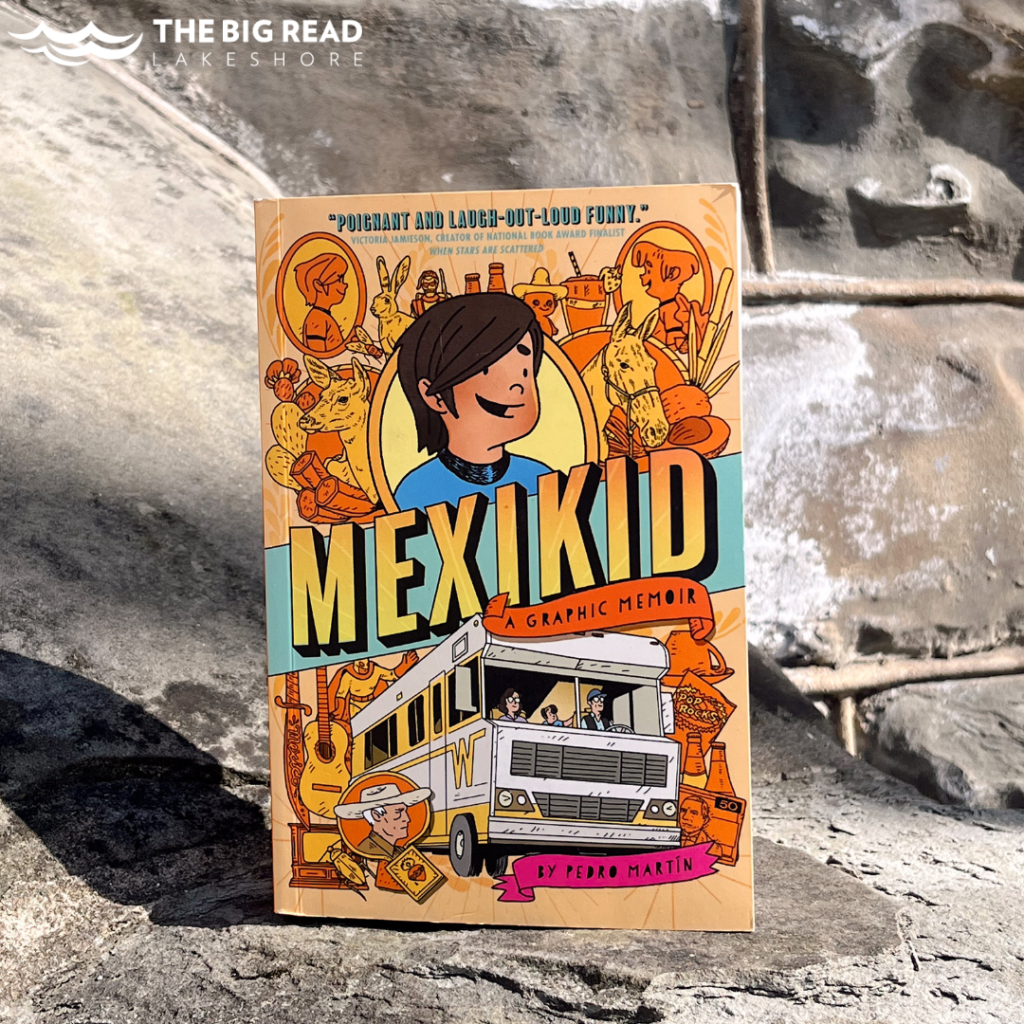By Greta VanDenend
Mexikid by Pedro Martin is a graphic novel memoir illustrating a young Mexican-American boy’s family and their adventure-filled road trip on a mission to bring their abuelito back from Mexico. Author Pedro Martin is a Mexikid, a child of Mexican parents but was born in the United States. This memoir involves characters with big emotions and exciting characters which makes it appropriate for kids ages 10-14 to read, however, this is also based on the child’s reading level.
Reading Graphic Novels
Looking from within, I found myself enjoying Mexikid because I hadn’t encountered graphic novels in my years of being a student, which surprised me. Like many of us, we are visual learners, but we are also visual readers, and the colorful artwork and engaging story kept me reading. Though I found myself getting lost while reading because I am so used to reading from left to right, you almost have to read a graphic novel from a different lens I wish I could practice more as a student.
As a future Special Education teacher, I couldn’t help but think about how beneficial this type of reading would be for students who struggle with a reading disability. However, students around may think that graphic novels make one “lesser of a reader”, which is a myth. It places a new perspective of reading into their hands where they can look at reading as something exciting. Because of this, I believe that Mexikid along with other graphic novels should be used in future middle school classrooms as it teaches students to change their pace and perspective of reading.
Windows and Mirrors in Reading
Furthermore, Mexikid illustrates windows and mirrors in other experiences. The concept of windows and mirrors in education refers to the idea that books and other learning materials should serve as a look in and within. Mirrors represent literature and other materials that reflect a student’s own experiences and identity, allowing them to see themselves represented in what they are learning. This representation helps to build self-esteem and promotes a sense of belonging.
Windows, on the other hand, represents literature and other materials that provide students with a view of the experiences and cultures of people who are different from themselves. By exposing students to diverse perspectives, they can develop empathy and an appreciation for other cultures and ways of life. Windows and mirrors in education are important because they promote diversity, equity, and inclusion. By ensuring that students have access to literature and other materials that reflect their own experiences, expose them to different perspectives, and allow them to imagine new possibilities, educators can create a more inclusive and equitable learning environment.
Family in Mexikid
In addition, an element of importance in Mexikid is family. This family consists of many generations who live closely knit together. Their mission to Mexico might look different than what our everyday family missions look like.

As they start their journey in this great big camper, I imagine complete chaos but deep excitement at the opportunity to gather as one family. This is an example of unity within the Mexican culture and knowledge of their family’s history. “Our house was built to comfortably fit a family of five. But we were a family of eleven! And we were about to get EVEN BIGGER” (Martin, 5).
Gathering together as one big family is important to me, but it looks different because this may only be once a week and during holidays. While reading, this deep sense of nostalgia developed when thinking back to how I grew up alongside my family. In another class, I remember we were assigned a family research project and it developed a huge shift in perspective within my family’s history. My mom, dad, and grandparents shared amazing stories of sacrifice, courage, love, faith, and perseverance. Through these stories, I have a better understanding of myself. Now getting the opportunity to read Mexikid, I was able to deepen this understanding of what family means to me. Family is filled with joy, sacrifice, and walks in between yet choosing to stick together means that we will never be alone. I admired this about Pedro and his family.

Bio:
Greta VanDenend, born and raised in Holland, Michigan, is a senior at Hope College majoring in Special Education with a minor in English Education and Youth Ministry. She is highly involved with Campus Ministries as a Bible Study Leader, and in Athletic Ministries. She is also on the Cheer team at Hope. Outside of Hope, you will likely find her at the KIN coffee shop in Holland, Engedi Church, or playing pickleball with friends!




